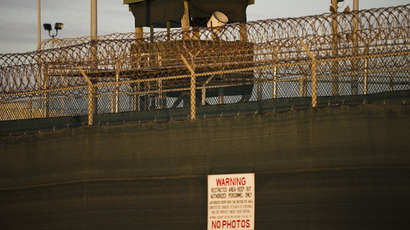200 days of Guantanamo hunger strike
As hungers strike at the Guantanamo prison enters its 200th day, the military reports of a decrease in the number of detainees refusing food. But the prisoners say conditions haven’t improved and their fate hasn’t become clearer.
RT's GITMO
hunger strike timeline
37 detainees currently remain on hunger strike after nearly seven
months without food, with 33 of them being force fed, the prison
authorities said on Saturday.
But lawyer for several Guantanamo detainees, Carlos Warner, said
that the data coming from the military, who even refused to
acknowledge the strike when it began, can’t be considered
reliable.
“We don’t know what the military use as their metric to say
that somebody isn’t hunger striking,” he told RT. “They
make different claims, but they never attach names to the people,
who are or aren’t hunger striking. We don’t know if it’s the same
37. We don’t know if it’s a different 37.”
“The bottom line is that we believe the hunger strike is grand
in duration and in size,” Warner added.
The attorney said that, according to his phone conversations with
his clients, conditions in the camp “are just as bad as
they’ve always been – suffering, tube feeding, people not getting
along, no communication with the military.”
“Although the military is telling us that the numbers have gone
down. That’s not the story that we’re hearing. We’re hearing
again, that this horrible suffering is going on and this is the
200th day of it,” Warner stressed.
The hunger strike started early February after several inmates
accused the guards of interfering with their personnel
belongings, which included mishandling of Korans.
But the action rapidly transformed into a protest by the
prisoners against their indefinite detention at Guantanamo Bay
prison, opened in Cuba in 2002 to detain captives in the Global
War on Terror, which the US started after the 9/11
attacks.

Out of the 166 Gitmo detainees, 86 have been cleared for release,
while 47 others are considered too dangerous for release, but are
not facing prosecution as evidence against them was obtained
through torture and other illegal means.
24 more are considered eligible for prosecution and just 9 have
been charged with a crime or convicted.
More than two-thirds of Guantanamo’s inmates refused food when
the strike was at its peak, with many finding themselves in a
life or death situation.
In order to avoid lethal cases, the prison authorities applied
force feeding procedure to the prisoners, despite it being
labeled as “torture” by the UN Human Rights Commission.
The once-a-day procedure required the detainees to be strapped
into a chair, with a tube pushed into a nostril and a mainly
protein-based solution pumped into the digestive tract.
At some point over 40 prisoners were subject to force feeding,
which they described as extremely painful or even unbearable.
The lawyer of Shaker Aamer, who is the last British resident
remaining in Guantanamo Bay, has recently shared one of the
dreams his client was experiencing during the hunger strike.
"The dream is about Obamacare, the president is strapped
tightly into a force-feeding chair. He is vomiting on himself
because they are forcing the liquid nutrient into him at very
high speed,” attorney Clive Stafford Smith told the Guardian.
During the holy month of Ramadan when the Muslims are obliged to
fast during daytime, the force feedings were rescheduled to take
place after dark.
There were also alarming reports of sexual abuse coming from the
prison, with inmates saying they were submitted to humiliating
genital searches every time they exited the camps to speak with
their lawyers.
"We no longer have any respect in this prison,” Bisheer al
Marwalah, a Yemeni detainee, told his attorney. “They don't
respect our life, our dignity, they don't respect our religious
feelings... As for tomorrow, we have no idea what it will
bring.”

Last week, Pentagon defense attorney, James Connell, spent 12 hours inside Guantanamo’s
Camp 7, promising to file a motion to the prison commander,
challenging the conditions at the facility as they “don’t meet
the standards for preventative detention under the laws of
war.”
And it’s the American taxpayers, who are picking up the
ever-increasing tab for keeping Gitmo operational. The facility
costs nearly half a billion dollars per year with the tag for a
single detainee at $2.7 million, which is over 35 times higher
than similar costs at the most expensive domestic prison in the
US.
The promise to close Guantanamo was one of the key points of
Barack Obama’s election campaign back in 2008. Despite one of his
first moves as the president being an order to do so, the
facility still remains active.
Obama’s latest pledge regarding Gitmo inmates was voiced in a key
security policy speech in May, which was a response to the
concerns over the hunger strike voiced by some international
bodies, including the UN, the EU and the International Committee
of the Red Cross.
Obama said that 86 inmates, who were cleared for release in
January 2010 by the inter-agency Guantanamo Review Task Force,
would be given freedom. The majority of those on the list – 56 –
are the citizens of Yemen.
According to the ‘Gitmo Clock’, put online by activists calling for
the prison’s closure, 91 days have passed since the announcement
was made and only two prisoners, of Algerian origin, have left
Guantanamo.
The US president has repeatedly blamed Congress for interfering
with his plan to close Guantanamo. However, critics say he simply
lacks political will.














